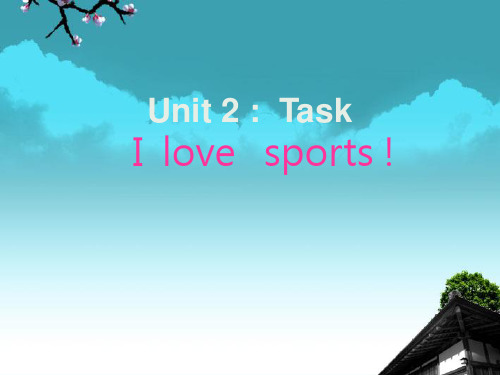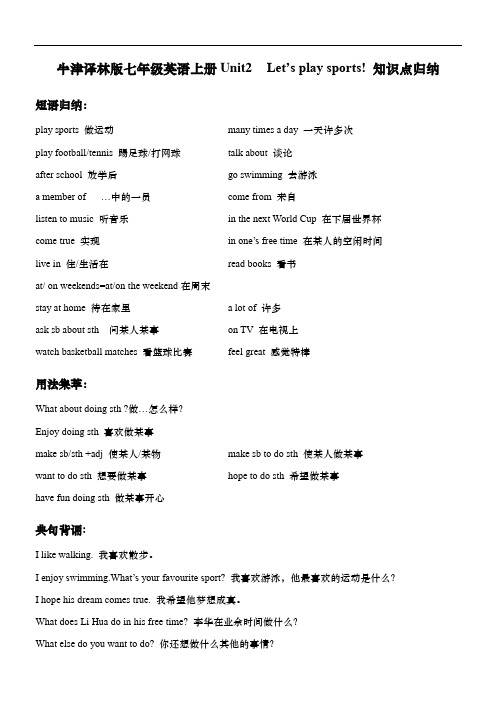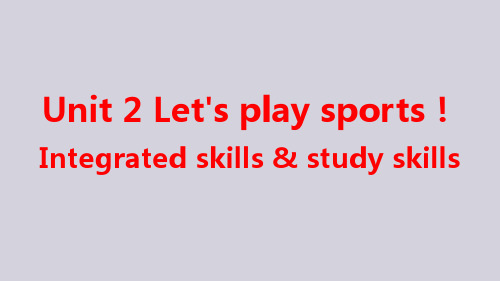江苏省七年级英语上册 Unit 2 Let’s play sports(第4课时)教案 (新版)牛津版
- 格式:doc
- 大小:36.50 KB
- 文档页数:4


牛津译林版七年级英语上册Unit 2Let's play sports知识点讲解7A Unit2 Let’s play sports !重要句型1.I walk to my bowl three times a day。
我一天走向我的碗三次walk to sw 走向某地three times/twice/once 三次/二次/一次对three times a day 提问用how often 多久一次2. their favourite sports 她们最爱的运动。
one’s favourite sth 某人的最爱某物My favourite colour is green 。
=I like green best。
我最爱绿色。
3.like/love/enjoy doing 喜欢/享受做某事enjoy oneself =have fun 玩得开心4. What’s your favourite sport =What sport do you like best 你最爱的运动是什么?5.What about you?=How about you 你呢?what about doing sth 做某事怎么样about +doing6.He is a new member of Huanghe Football Club。
他是黄河俱乐部的一员。
Sb be a member/members ……=sb be in ……7.He looks strong。
他看起来很强壮。
How does he look?look+adj look like sth8. He play football very well。
他足球踢得很好。
V+adjHe is a good teacher。
他是一个好老师。
adj +n9.in his free time在他空闲时间里=when he is free=when he has free time。

Unit 2 L et’s play sportsGrammar一、教学目标1. 掌握本课重点词汇:drawing, weekend, at/on weekends, of course, shop2. 掌握本课重点句型:I/You/We/They like sports.He/She/It likes sports.I/You/We/They do not/don’t like sports.He/She/It does not/doesn’t like sports.Do I/you/we/they like sports?Yes, you/I/we/they do.No, you/I/we/they don’t.Does he/she/it like sports?Yes, he/she/it does.No, he/she/it doesn’t.3.理解行为动词一般现在时的用法。
4.掌握行为动词一般现在时的肯定句、否定句、疑问句以及其肯定和否定回答的基本用法。
5.用行为动词的一般现在时态介绍家庭的日常生活。
二、教学重点及难点重点:1. 掌握行为动词的一般现在时态的构成和基本用法。
2. 能用行为动词的一般现在时态介绍家庭的日常生活。
难点:正确使用行为动词的一般现在时态介绍家庭的日常生活。
三、教学过程Task 1Step 1 Warming-upReview some information about Li Hua.【设计意图】通过询问学生有关李华的信息,既复习了上节课的一些内容,同时又导出了今天所学的语法项目,为接下来系统的语法学习做铺垫。
Step 2 Presentation1. Read the sentences about Li Hua with the simple present tense and try to find out the grammar rule.2. Learn the rules: when to use the simple present tense.3. Ask Ss to match the sentences with grammar rules.【设计意图】通过介绍李华的句子引出语法点。

牛津译林版七年级英语上册Unit2 Let’s play sports!知识点归纳短语归纳:play sports 做运动many times a day 一天许多次play football/tennis 踢足球/打网球talk about 谈论after school 放学后go swimming 去游泳a member of …中的一员come from 来自listen to music 听音乐in the next World Cup 在下届世界杯come true 实现in one’s free time 在某人的空闲时间live in 住/生活在read books 看书at/ on weekends=at/on the weekend在周末stay at home 待在家里 a lot of 许多ask sb about sth 问某人某事on TV 在电视上watch basketball matches 看篮球比赛feel great 感觉特棒用法集萃:What about doing sth ?做…怎么样?Enjoy doing sth 喜欢做某事make sb/sth +adj 使某人/某物make sb to do sth 使某人做某事want to do sth 想要做某事hope to do sth 希望做某事have fun doing sth 做某事开心典句背诵:I like walking. 我喜欢散步。
I enjoy swimming.What’s your favourite sport? 我喜欢游泳,他最喜欢的运动是什么?I hope his dream comes true. 我希望他梦想成真。
What does Li Hua do in his free time? 李华在业余时间做什么?What else do you want to do? 你还想做什么其他的事情?Reading is fun. 读书是有趣的事情。


新牛津译林版七年级英语上册Unit2Let’splaysports!第4课时(教案)Unit 2 Let’s play sports!教案GrammarI. Teaching aims and learning objectivesBy the end of the lesson, students should be able to:1. be clear about the usage of the simple present tense of the verb to do;2. use this tense to make up positive and negative sentences, ask and answer questions;3. talk about something about themselves and their classmates using this tense;4. fin ish the exercises on the textbook correctly.II. Teaching contents1. New words and phrases: drawing, weekend, at/on weekends, of course, shop2. New structures: I/You/We/They like sports.He/She/It likes sports.I/You/We/They do not/don’t like sports.He/She/It does not/d oesn’t like sports.Do I/you/we/they like sports?Yes, you/I/we/they do.No, you/I/we/they don’t.Does he/she/it like sports?Yes, he/she/it doesNo, he/she/it doesn’t.III. Focus of the lesson and predicted area of difficulty1. Sum up how to use the simple present tense of the verb to do to make up positive and negative sentences, ask andanswer questions;2. Sum up the rules of the third person singular form.IV. Teaching proceduresStep 1 Lead-inT: Today we’ll learn grammar of Un it 2—the simple present tense of the verb to do. B oys and girls, let’s play a guessing game first. There is a photo in my hand. Can you guess who it is? You can guess like this: Is it a man? Is he/she a teacher? Is he/she famous? You are so clever. This is Messi. Can you tell me anything about him? Pay attention to these sentences.(1) He looks strong. He plays football very well.(2) He wants to play in the next World Cup.(3) Many students like him.T: All the sentences are written in the simple present tense of the verb to do.【设计意图:通过学生比较感兴趣的游戏导入新课,使其迅速进入本课话题,增加了课堂的趣味性。
七年级上册单元要点梳理Unit2 Let’s play sports!一、教学目标1. Talk about Simon’s favourite football player.2. Use the new words to talk about a player.3. Use the correct forms of the verb to do to talk about activities.4. Recognize the sounds of the five vowel letters in the stressed closed syllables.三、重点词组(短语)like / enjoy / love walking. 喜欢散步。
many times a day 一天许多次go swimming 去游泳my favourite football player 我最喜爱的足球运动员a member of... ……中的一员play football very well 足球踢得很好in one’s free time 在某人的空闲时间enjoy listening to music 喜欢听音乐be in...club 在……俱乐部stay at home 呆在家里at/on weekends=at/on the weekend在周末of course 当然many of many students 我的很多学生talk about/of 谈论a lot of=lots of 许多play table tennis 打乒乓球watch basketball matches on TV 看电视上的篮球比赛四、重要句子(句型)1. Let’s play sports. 让我们来做运动。
2. What’s your favourite sport?你最喜欢的运动是什么?3. What/How about you? 你呢?4. It makes him happy. 它使他开心。
Unit 2 Let’s play sports第四课时 Grammar课时目标导航1. 理解行为动词一般现在时的用法,掌握其否定句、一般疑问句的构成形式,及一般疑问句的肯定和否定回答。
2.掌握行为动词一般现在时第三人称单数的构成规则及其用法。
3. 能熟练使用一般现在时的各种形式来谈论人或物。
课前自主梳理开心预习梳理,轻松搞定基础。
I. 在一般现在时中,当主语是第三人称单数时,表示行为动作的动词要变化,下列词你能给变出来吗?1. work2. teach3. go4. fly5. have6. wash7. play8. swim9. enjoy 10. doII. 一般现在时一般有四种用法,请将所给的句子写到所表示的用法下面。
1. Li Na is good at tennis.2. We can speak English now.3. Eddie walks to his bo wl four times a day.4. Miss Gao wears a b lue jeans today.5. Earth goes around the sun.6. Li Qi likes singing.7. Peilong gets up at 6:00 every day.8. Simon has short hair.用法① 表示经常性或习惯性的动作,也就是谈论我们经常性或习惯性做的事情:用法② 表示客观存在的事实和规律,即谈论一直以来总是真实存在的事情:用法③ 表示现在的状态或特征,即谈论现在是真实存在的事情:用法④ 表示现在具备的性质和能力,也就是谈论的事物或人现在的特征或能做什么:课堂合作研习重难疑点,一网打尽。
III. 用所给单词的适当形式填空。
(删除原第5小题)1. I usually (go) running for half an hour at weekends.2. My grandparents (like) watching TV very much.3. This (be) my cat. It (love) me.4. She often (finish) her homework at 9:00 in the evening.5. We (not have) a Music lesson on Thursday.6. David (enjoy) (swim) very much.IV. 句型变变变。
Unit 2 Let's play sports词汇默写1.让某人做某事 let sb do sth 让他回家。
Let him go home.2.做运动do / play sports 步行上学 walk to school = go to school on foot 骑自行车上学 ride (a bike) to school = go to school by bike3.喜欢做某事(3)like/love/enjoy doing sth.他喜欢散步。
He enjoys walking.4.走到我的碗那儿 walk to my bowl 走回家/走到这儿/走到那儿 walk home/ here /there5.去散步/跳舞/购物/游泳go walking/ dancing/shopping/swimming6.一天许多次 many times a day 一个月两次 twice a month7.打排球 play volleyball 打乒乓球 play table tennis8.打网球打得很好 play tennis well 一个好学生 a good student9.他们最喜欢的运动 their favourite sports10.我最喜爱的足球明星 my favourite football star11.我最喜欢的课是数学。
(2)I like Maths best.= My favourite lesson is Maths. 阅读是我的最爱。
Reading is my favourite.12.他每周去游泳。
He goes swimming every week.13.做某事怎么样?What about doing sth.? 吃鱼些怎么样?What about eatingsome fish?14.非常喜欢运动 like sports very much 大家非常喜欢他。
Unit 2 Let’s play sports!单元写作指导与演练近三年考情分析本单元的话题是“体育运动”,要求学生能简单介绍自己或他人喜爱的体育运动,本单元写作要求同学们能根据相关信息提示简单地介绍自己或他人喜爱或者擅长的体育运动。
内容包括喜爱的原因、能力、身体健康情况、运动的频率以及理想和崇拜的体育人物等。
在具体的写作中,学生应做到以下几点:1. 能用一般现在时介绍自己或朋友喜爱或者擅长的体育运动;2.能用多种表达方式表达喜好;3. 能正确使用标点符号:4. 能正确书写英语句子。
(以思维导图的形式呈现)【词汇积累】1.walking n.散步, 步行2.time n.次, 回3.tennis n.网球4.volleyball n.排球5.enjoy v.享受...的乐趣;欣赏;喜爱6.go swimming去游泳7.player n.运动员8.member n.成员【句型积累】1.I love sports.2.I like …very much.3.I enjoy ....4.…is my favourite sport.5.…is my favourite ... player/star.6.I like walking/swimming/...7.I like playing football/basketball/volleyball/tennis.8.I often play ... with ....9.…make(s) me happy/feel great.10.It is fun.【句式积累】1. I like sports, I like football (basketball:根据作文, 填具体的运动) very much.2. Yao Ming(根据作文, 填最喜欢运动员是谁) is my favourite basketball player. He plays basketball very well. He is my hero.(这三句话可以放一起写)3. He is a member of our school basketball team. He often plays basketball with his friends after school.(日常如何)4. He studies English in his free time. He also enjoys listening to music. Because it makes him happy.(业余时间)5. I want to be a basketball player when I grow up. I hope my dream can come true.(梦想)6. I love music. Sometimes I listen to music,because it makes me feel great.(音乐)7. I love reading. I read a lot of interesting books. Reading is fun. (阅读)请根据下面表格中的提示,介绍一下你的几位同学的爱好。
Unit 2 Let’s play sports!GrammarI. Teaching aims and learning objectivesBy the end of the lesson, students should be able to:1. be clear about the usage of the simple present tense of the verb to do;2. use this tense to make up positive and negative sentences, ask and answer questions;3. talk about something about themselves and their classmates using this tense;4. finish the exercises on the textbook correctly.II. Teaching contents1. New words and phrases: drawing, weekend, at/on weekends, of course, shop2. New structures: I/You/We/They like sports.He/She/It likes sports.I/You/We/They do not/don’t like sports.He/She/It does not/doesn’t like sports.Do I/you/we/they like sports?Yes, you/I/we/they do.No, you/I/we/they don’t.Does he/she/it like sports?Yes, he/she/it does.No, he/she/it doesn’t.III. Focus of the lesson and predicted area of difficulty1. Sum up how to use the simple present tense of the verb to do to make up positive and negative sentences, ask and answer questions;2. Sum up the rules of the third person singular form.IV. Teaching proceduresStep 1 Lead-inT: Today we’ll learn grammar of Unit 2—the simple present tense of the verb to do. Boys and girls, let’s play a guessing game first. There is a photo in my hand. Can you guess who it is? You can guess like this: Is it a man? Is he/she a teacher? Is he/she famous? You are so clever. This is Messi. Can you tell me anything about him? Pay attention to these sentences.(1) He looks strong. He plays football very well.(2) He wants to play in the next World Cup.(3) Many students like him.T: All the sentences are written in the simple present tense of the verb to do. 【设计意图:通过学生比较感兴趣的游戏导入新课,使其迅速进入本课话题,增加了课堂的趣味性。
运动员梅西的资料介绍既复习了上节课的一些内容,又导出了今天所学的语法项目,一举两得。
】Step 2 Presentation1. Sum up the usage of the simple present tense.(1) General introduction.T: We use this tense to express things that we often do, things that are always true and things that are true now. Here are some examples.a. Millie gets up at 6:30 every morning.b. Cats eat fish.c. Simon likes playing football.(2) Matching.T: Would you please match the given sentences with the correct usage?things that we often do Fish live in water.I go to school by bike every day.things that are always true I live in Wuxi.I go to the Reading Club every Tuesday.things that are true now Daniel enjoys swimming.The earth travels around the sun.2. Sum up the structure of the simple present tense.(1) Positive sentences.a. Answer the questions using the simple present tense.T: Would you please answer the following questions with the help of the pictures. How do you go to school?How do they go to school?How does she go to school?What do you do after school?What does he do after school?What does she do after school?b. Sum up the forms of positive sentences.I/You/We/They like sports.He/She/It likesT: Please pay attention to the third person singular form in this tense.c. Write out the third singular form of given words and work out the rules.(1) like→likes play→plays Most verbs: + s(2) study→studies fly→flies Verbs ending in a consonant + y: -y + ies(3) watch→watches wash→washes dress→dresses fix→fixesVerbs ending in ch, sh, ss or x: + es(4) go→goes do→does Some verbs ending in o: + esT: can you think of more words in each rule?d. A game.T: Here is a competition for you. Would you please speak out the third person singular form of given words as fast as you can. Group A and group B, the group that can speak out more right words will win the match.put→puts enjoy→enjoys teach→teaches fly→fliesguess→guesses match→matches go→goes study→studiescarry→carries worry→worries have→has stay→stays(2) Negative sentences, ask and answer questions.a. Show a dialogue.T: Simon and Millie are talking about sports. Read their dialogue, and pay attention to the words in red.Simon: I like basketball very much. How about you?Millie: Yes, I do. But I don’t like football.Simon: Does your sister like football?Millie: No, s he doesn’t like football. She likes basketball, too.Simon: Do your family often watch basketball games on TV?Millie: Yes, we do.b. Sum up the forms of negative sentences.T: Let’s summarize how to make up negative sentences of this tense.I/You/We/They do not/don’t like sports.He/She/It does not/doesn’tc. Make sentences.T: Now, boys and girls, please make up sentences with your partner like this:I like playing tennis, but my partner doesn’t like playing it.My partner likes watching ball games, but his/her mum doesn’t like watching ball games.…d. Sum up the forms of questions and answers in simple present tense.Do I/you/we/they like sports?Does he/she/itYes,you/I/we/they do.he/she/it does.No,you/I/we/they do not/don’t. he/she/it does not/doesn’t.【设计意图:教师总结一般现在时常见的三种用法,让学生在例句中体会,在练习中操练,既降低了难度,又帮助学生巩固所学内容,将比较抽象的语法意义形象化,具体化。